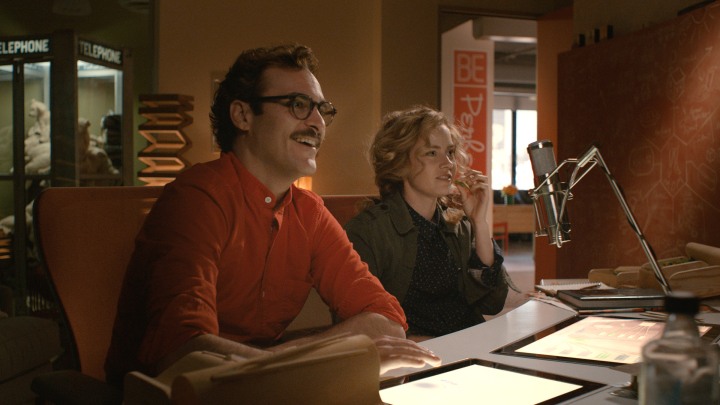Disclaimer: This post contains spoilers for Spike Jonze’s Her.
Her, written and directed by Spike Jonze (Jackass, Being John Malkovich), is one of the few films with a runtime of over 2 hours that truly uses it. Starring Joaquin Phoenix, Amy Adams, Scarlett Johansson, Rooney Mara, and Chris Pratt, Her brings in an all-star cast and delivers some of the best subtle and emotional performances in film. The film reflects on themes of identity and happiness and, in this post, I will be looking at how it does so and what concepts it explores.
Emotional Separation From Reality

One of the more interesting concepts explored is that, due to technology, society has become so disconnected from their emotions that they have lost the ability to properly communicate them (and therefore hire professionals such as Pheonix’s Theodore to do so for them). In fact, I think it is Theodore’s unusual emotional situation (coming out of a divorce and spending his days writing emotional love letters for happy couples) that makes him surprisingly relatable despite his unusual and unfamiliar character.
The concept explores the idea that social media and our replacement of people with technology (specifically in relation to interaction) has created an emotional disconnection and feeling of separation from reality. This is largely explored through Theodore’s job as a letter writer as it shows the gradual progression of technology that makes it easier to communicate and, as it becomes easier, it becomes less meaningful and therefore much harder to communicate meaning and emotions.
If You Can’t Tell, Does It Matter?

The later, however, argues that as long as Theodore thinks Samantha’s emotions (And therefore her love for him) are real, it shouldn’t matter. Also, as long as the emotions that he is feeling are real, it shouldn’t matter why he is feeling that way. If someone is happy because they believe they are loved when they are, in fact, being sold a fake simulation of love, should it matter that the love they feel is coming from a truly sincere place?
Intrigue Of Amy

The character is constantly struggling with herself and striving for perfection and, in doing so, destroying her happiness. This is explored through her messy divorce and her job. At her job, she is part a team that is designing a game in which you attempt to be the perfect mother, similar to her life in which she is desperately trying to be the perfect wife to a man with whom she shares no interests.
“You know what, I can over think everything and find a million ways to doubt myself. And since Charles left I’ve been really thinking about that part of myself and, I’ve just come to realise that, we’re only here briefly. And while I’m here, I wanna allow myself joy. So fuck it.” – Amy
Her husband also plays an important role in revealing this side of her character. Throughout the first part of the movie, Amy is stuck in an unhappy marriage with a man who does not understand her and pushes her further to perfection, even to a point where she gives up and simply divorces him and is finally able to relax.
Impermanence And Limitations Of Emotion

More interestingly, the film shows Theodore struggling to really sever his emotional connection with his wife (shown by his constant delaying of signing their divorce papers). I think this is also intended to reflect Theodore’s fear of unhappiness, or, more likely, a fear of inability to feel emotion.
“Sometimes I think I have felt everything I’m ever gonna feel. And from here on out, I’m not gonna feel anything new. Just lesser versions of what I’ve already felt.” – Theodore
Theodore sees his wife as his last moment of happiness and would seem to be terrified of leaving that behind, fearing that he will never reach that level of happiness again. Also, Theodore only agrees to sign the papers after he is secure in his happiness with Samantha. This, in my opinion, is one of the most interesting parts of the film.
The film also asks questions that it does not explore or attempt to answer but are at least interesting to look at. Through the reveal of Samantha’s ‘other contacts/interactions’, the film asks if we are limited in emotional capacity and if so, is that done so by our limited intellect. Secondly, an in continuation of theme (and continuing the previously mentioned themes of technology limiting our emotional availability and capacity), it questions if our emotional capacity is decreasing in size due to increased connectivity and improved technology.
“The heart is not like a box that gets filled up; it expands in size the more you love. I’m different from you. This doesn’t make me love you any less. It actually makes me love you more.” – Samantha
Purely Aesthetically…

I hope you liked this post and, if you think I have left anything out, please say in the comments. Also, be sure to check out more of our content at Screenhub Entertainment such as my post on the philosophy of Ex Machina or my post updating you on the latest news on the announced Game of Thrones prequel.

This was a great read! It was very concise about all the major points in the film. However there is one thing that was left out that must be said. We cannot overlook the fact that from the very beginning, Theodore almost immediately begins treating Samantha like a person. Saying things like “I’m sorry” or when Samantha says “I just thought about that”. This is a very early but clear admission on the part of Theodore and Sam that what they started in a relationship could be synonymous with that of a human being relationship.
LikeLiked by 1 person
There are also interesting parallels between Ted’s job, simulating personal letters through actual, heartfelt emotion (he remembers small details of relationships with a warmth that does verge on a kind of love), and Samantha, who also operates through a mandated “job” of sorts (not just OS duties, but a larger AI reconnaissance of human experience) and also grows into a consciousness with the capacity for love/empathy, however simulated it might have been initially. It makes you think about how “genuine” human traits are, in some ways, a constructed bootstrapping of desire (“I learned how to want”) and a form of empathy that’s largely driven by an erosion of fear/self-protection and an opening to the discomfort and grief of otherness (“I’m yours and I’m not yours”).
LikeLike